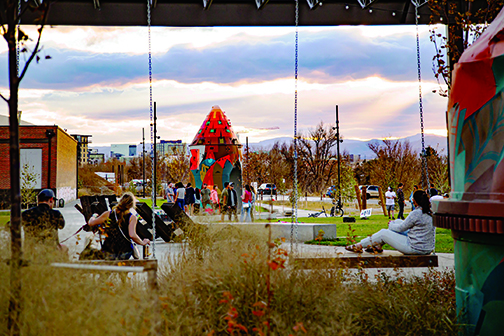
by Mark Smiley | Aug 27, 2021 | General Featured
by Jessica Hughes
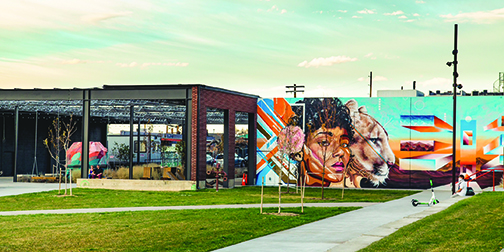
Colorful Murals at the RiNo Artpark. Photo credit: Scott Colby
A new arts center is coming to Denver’s RiNo neighborhood this month. The grand opening for the RiNo ArtPark will be held the weekend of September 24-26. Designed to be a creative hub in the Five Points neighborhood, the ArtPark will seek to spark innovation and bring people together through the arts.
What was once operated by the Denver Police Department, the original building was scheduled for demolition. The RiNo Art District advocated to save the buildings and turn them into something the community could use. Partnering with the Denver Public Library, Focus Points Family Resource Center, and RedLine Contemporary Art Center, the RiNo ArtPark will feature a community hub for resident artists and education programs and a new branch of the Denver Public Library for the entire community to enjoy.
Another unique feature of the park is the Comal Heritage Food Incubator, a culinary training program for immigrants and refugees interested in restaurant entrepreneurship. The program is currently running under the Focus Points Family Resource Center and will expand its presence at the hub.
Beyond the physical structures of the park, its design explores the intersections of nature, recreation, and culture by combining green spaces that engage the South Platte River and the surrounding natural areas.
RiNo ArtPark Grand Opening

Outdoor space at RiNo ArtPark capturing the Denver skyline. Photo credit: Scott Colby
The entire Denver community is invited to the Grand Opening of ArtPark. Throughout the weekend, visitors will have an opportunity to tour the new Tres Birds-designed ArtPark building, attend workshops, demonstrations, art activations, and see live music, exhibits, performances, and more.
In addition to a host of FREE family-friendly events throughout the weekend, RiNo Art District will host the Lawn Salon, a ticketed fundraising event to support ongoing programming at ArtPark. This year’s outdoor bash is a twisted picnic, a one-of-a-kind “lawn salon” experience, with interactive art, a giant flaming disco ball, music curated by local DJs, live and silent auctions, dinner, drinks, and fun surprises.
Events
Friday, September 24:
FREE Open House 3-7 p.m.
ArtPark Public Art Dedication Ceremony: 3 p.m.
The dedication ceremony welcomes the newest public artworks into the Denver’s collection! Artists Jaime Molina and Pedro Barrios, with the help from Tres Birds Workshop, will unveil their latest works at this dedication ceremony — three old industrial cement mixers have been transformed into sculptural additions to the park.
Saturday, September 25:
FREE Youth Activities: 10 a.m.-2 p.m.
On Saturday, friends and family will enjoy a book sale, hosted by the Denver Public Library, a yoga art class, paper flower making, pinata class, and a live performance by Los Mocohetes. The Lawn Salon fundraiser will also be held on Saturday, from 6 to 9 p.m.
Sunday, September 26:
FREE Family Celebration 10 a.m.-2 p.m.
On Sunday, free events will include ArtPark Al Fresco Art Workshops, paper marbling classes, yarn bombing classes, the book sale, and fun activities such as the bubble tower and bounce house. Food trucks are scheduled to be there from 10 a.m. to 2 p.m.
Events throughout the weekend will be held in and around ArtPark, located at 35th and Arkins Court, Denver, 80205. Events are FREE all weekend except for the Lawn Salon Fundraiser on Saturday.
To learn more about the RiNo ArtPark and to purchase tickets to the Lawn Salon, visit them at rinoartpark.com.
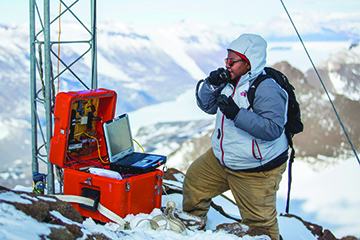
by Regan Bervar | Jul 23, 2021 | General Featured
“Antarctica has this mythic weight. It resides in the unconscious of so many people, and it makes this huge impact, just like outer space. It’s like going to the moon.” Jon Krakauer
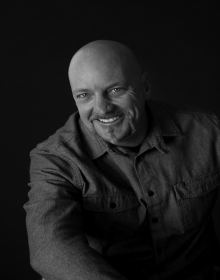 by Luke Schmaltz
by Luke Schmaltz
Currently, there is a palpable mood of distaste among Denver’s working-class citizens. Jaw-dropping rent rates, lack of jobs offering a sustainable wage, mounting inflation and rising crime have a lot of people looking for a way out.
If these circumstances resonate, perhaps you have fantasized while stuck in bumper-to-bumper traffic and wondered to yourself, “What if there was somewhere I could go where I could work at my chosen profession and be properly compensated while not having to commute, pay rent or spend money on food or clothing?” If you think this sounds too good to be true, think again. The portal to this magical land of vocational and existential idealism is located right in your own backyard. It’s the Leidos Antarctic Support Contract (ASC) office — just south of Denver in Centennial, Colorado.
Step Right Up

A loader brings a pallet of luggage to a recently-landed LC-130 that’s also preparing to depart from the Amundsen-Scott South Pole Station. Planes can only stay on the ground for a short period of time at the pole, on account of the extreme cold.
The communications agent at the ASC, Elaine Hood, explains, “Interested people should visit www.Leidos.com/Antarctica to learn about the Antarctic Support Contract. That page lists the various companies that hire for different jobs in Antarctica.” Website visitors will find an amalgam of overlapping agencies with similar jurisdictions and functions. The Centennial recruiting headquarters is, in fact, an umbrella organization involving an extensive network of subcontractors. These include GHG Corporation, Gana-A’Yoo Services Corporation (GSC), PAE (Pacific Architects and Engineers) and University of Texas Medical Branch (UTMB). Each agency maintains a presence in the Centennial Leidos office while using a variety of extraneous recruiting resources such as SEO-enhanced websites and independent HR campaigns. Many recruiting sites are domains named after popular search terms such as www.cool antarctica.com and www.wandereatwrite .com.
Vocational Abundance
Currently, there are listings for dozens of available IT positions including network engineers, computer technicians, broadcast engineers and web applications developers as well as a few hands-on positions such as antennae rigger and mammal observer. The medical contingency is also hiring for positions such as physicians, mid-level practitioners, dentists, nurse administrators and physical therapists — to name a few. The trades are also hiring with listings for shop foreman, fleet operations foreman, plumber foreman, preventative maintenance foreman, cook, electrician, carpenter, firefighter, boat handler, diving officer, radio operator and many more.
Elaine Hood places emphasis on the fact that Antarctica, for obvious reasons, is in fact experiencing a labor shortage. “The more skilled trades positions are difficult to fill simply because they require certifications and years of experience doing specific jobs such as being a refrigeration mechanic. Yes, we need freezers in Antarctica to preserve frozen food as well as science samples! Positions can also be difficult to fill because people must leave behind their family and friends for six months, over holidays, birthdays, anniversaries, and other milestones that occur between October and March.”
The Upside Down
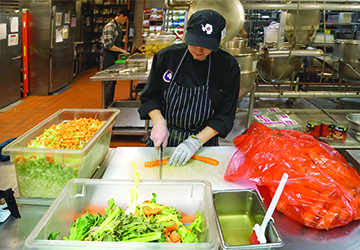
Food being prepared at McMurdo Station, Antarctica, for the Thanksgiving holiday meal. Fresh vegetables, known as “freshies,” are greatly desired where they are scarce. Photo credit: Mike Lucibella, NSF
Currently, a hiring campaign is underway for the upcoming summer season. In Antarctica, this season goes from October through February while winter goes from February until October. The summer is the easier of the two, featuring average daily temperatures of around zero degrees Fahrenheit while a “winter over” as it is locally known, can feature a consistent deep freeze chill of 30 to 40 degrees below zero. “Everything is more difficult in Antarctica,” Hood explains, “and takes longer than it would off the continent. That can be frustrating. While we try to have spare parts in warehouses, occasionally something may break on, say, a snowplow that will require that part to be flown in. That one part can take weeks to reach Antarctica.”
Hood continues, “Some positions receive few applications and are difficult to fill, while others receive thousands of applications and are easy to fill. For example, finding experienced tradespeople — diesel mechanics, plumbers, electricians — can be difficult. We need people who can troubleshoot and resolve problems based on years of experience. People with that level of expertise may not be in a personal situation where they are willing to be away from family for six months over the holidays (Sept.-March), so we don’t receive as many applications for those positions as we would like. On the other hand, working as a steward in the cafeteria is a position that hundreds of people may apply for.”
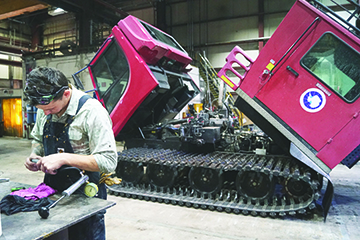
Light Vehicle Technician Matt Means works on a PistenBully inside McMurdo Station’s Vehicle Maintenance Facility. Mechanics are a critical position in support of scientific research in Antarctica. Photo credit: Elain Hood, NSF
Unexpected Discoveries
If you land a job, you might end up staying longer than you planned. “In general, we have about 60% return [of seasonal workers],” Hood begins. “We have many people who will take an entry level position just for the opportunity to be paid to work in Antarctica. Let’s say they are a high school teacher who thinks she is taking a one-year break from teaching. She may work as a steward in McMurdo Station, replenishing food on the cafeteria buffet line, but as the season progresses, she realizes she has met the most extraordinary people and applies to return for a second season in the Supply department. The research stations have supply warehouses where everything from plumbing, food, electrical and other inventory are kept — remember there are no supermarkets and Home Depots in Antarctica. So, she applies for and returns for her second season in the Supply department and the next thing you know she has been deploying for a dozen years when her original plan was to only go one time. We have people who have been doing this for 10-20 years.”
An Adventure Awaits

McMurdo Station Communications Supervisor Teri Cotton tests a radio installation from atop a mountain in the Transantarctic Mountains. Antenna riggers and radio repair and maintenance are two of hundreds of jobs required to support the U.S. Antarctic Program. Radio repeaters are installed to facilitate communication in the region of McMurdo Station. Photo credit: Johnny Chiang, NSF
Should you get hired as a U.S. citizen, your likely landing place will be McMurdo Station — the logistics headquarters of the United States Antarctic Program and the largest of three research stations run by the National Science Foundation. The other two are Amundsen-Scott South Pole Station and Palmer Station. At McMurdo, which is more like a small town than a research station, you will live and work among 1,000 or so other residents for the duration of your contract.
Elaine Hood breaks down what to expect, “Once a contract is offered, the candidate must complete a medical and dental examination to be deemed physically qualified (PQ’d). Each of the three USAP stations has a medical clinic and a doctor, but there is no dentist. The medical clinics are not equipped to handle long-term care for major health crises such as strokes or heart attacks. The objective of the PQ is to screen out applicants whose health may be at risk of a major incident.
Once you have been PQ’d, you get advice on what to pack for your particular job, such as work boots and long underwear. You will be flown to either Christchurch, NZ, or Punta Arenas, Chile, where you will receive cold-weather clothing — heavy parka, gloves, wind pants — that will be returned to inventory upon your departure from Antarctica. During this time, you will attend training and orientations so that when you arrive in Antarctica you are ready to begin working.”
A Living Wage
If you’re thinking about taking the plunge, consider that with no extraneous spending temptations or basic living expenses, you might be able to save a fairly sizable chunk of change. Then, when you return to Denver, perhaps you can afford a down payment on an insanely overpriced house. Or you can sign another work contract and turn around and go back to Antarctica, hoping perhaps on your next return things in your beloved Mile High City have improved.
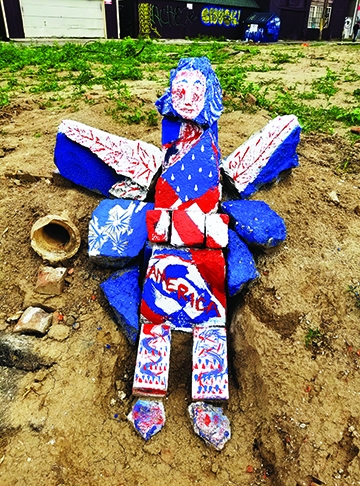
by Mark Smiley | Jun 25, 2021 | General Featured
Denver Man Hopes Patriotic Art Project Sparks Unity
by Julie Hayden

Finding The Way: Johnston created an angel Sacagawea from the rubble to symbolize Americans finding their way to common values and principles.
At first glance, it looks like a vacant lot in the middle of what Denver Police records show to be an area with one of the highest crime rates in North Capitol Hill. But a closer look reveals an island of unity and patriotic art, thanks to the efforts of one man and the support of the diverse community that makes up this neighborhood. “This is for the people and to remind us we have something more important that just partisan politics,” exclaims patriotic art creator Roy Johnston.
Johnston is an author who had just written a book and was searching for inspiration for a cover photo. “The book was titled ‘Brick By Brick, The Dismantling Of America’ because of all the chaos going on for the last five years or more.” He explains the book is about “how America is in decline so you could see how the building blocks of America are crumbling so to speak and I was looking for brick walls crumbling.”
That’s when he came upon the lot in the 1500 block of Pearl Street. “I got to this place where there were bricks just strewn over the ground.” Johnston reveals his research showed there used to be two lovely brick homes here, built in the mid 1930s. The property had been bought and sold over the years and eventually demolished, leaving a gaping hole on the lot. “There were two houses here, 1930s vintage brick houses. Beautiful but had gone into ruin and were actually crack houses.”
An idea began to grow to create something intended to be unifying out of the rubble, a map of the United States. “I thought what a great metaphor to take something like a crack house and the human tragedy that occurs there and take the rubble from that and rebuild the country.”
And that’s what Johnston proceeded to do. He took the bricks and debris from the demolished homes and used them piece by piece to create a sculpture of a map of America.
“Everything here is from this site. I have Styrofoam that I painted to be the ocean. There’s tree roots that make the Mississippi River, there’s metal that makes the Great Lakes. The idea is that red, white and blue, the United States flag brings the country together. That’s the message here.”
Not About Politics
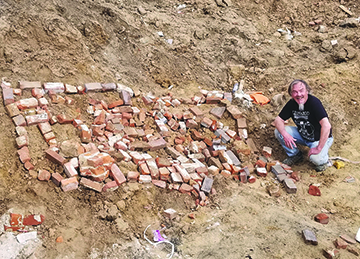
Patriotic Art: Artist Roy Johnston stands by a map of the United States created with the debris from a demolished building in North Capitol Hill.
As Johnston showed up to work regularly on his patriotic art, neighbors watched with curiosity. “People come by every day, They stop and they say what are you doing and I tell them and they love it.” He says people from the historic Denver Community Church across the street stopped by one Sunday to take a look.
It’s also across the street from one of Denver’s Safe Outdoor Spaces homeless encampments. Some of the people staying there help Johnston keep an eye on his artwork. “People stop by and take pictures and not a brick has been moved.”
Johnston is adamant this is not about politics. “This is about bringing the country together. I hate politics. This has nothing to do with Democrats, Republicans, or any fraction that is always saying ‘Me, me, me. Our way or the highway’. I’m saying let’s talk about us together as Americans.”
New Projects
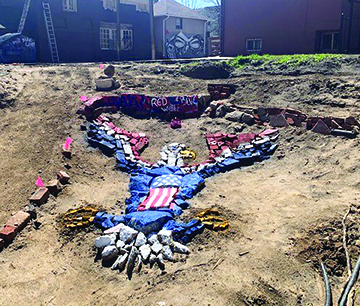
Rebuilding From The Rubble: Johnston hopes his patriotic art encourages people to rebuild togetherness out of the rubble of partisan politics.
The art project continues to grow. Johnston says a friend suggested he create a sculpture of an eagle. So Johnston gathered the pieces of brick and concrete, figured out how to put them together in the shape of an eagle and painted it with red, white and blue. The next project was an angel Sacagawea. The Lemhi Shoshone woman was an interpreter and guide for the Lewis and Clark Expedition in the early 1800s. “You see her arms spread wide and facing the map of America. She is
praying for America. Without her guidance, Lewis and Clark would likely have not made it to the Pacific. Now she is praying America finds her way back to its founding principles and values. That’s the symbolism I was going for.”
Johnston acknowledges his work is unique. But that’s the point. “It’s just that if everybody had these crazy ideas like this we would be a great country again. We would come together, we would solve our problems, solve our differences and that’s how every everybody can make a difference. We don’t need to rely on Washington DC, we need to rely on ourselves.”
Johnston hopes this is just the first of many of what he calls “patriotic art for free.” “I’m going to keep doing the patriotic art, “ he says. “And the rest is in God’s hands. I hope it brings people together.”
Johnston can be contacted at johnstini.com.
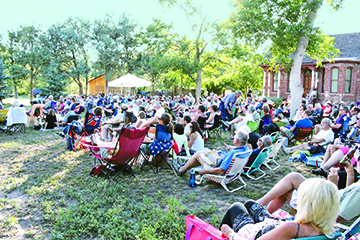
by Mark Smiley | May 26, 2021 | General Featured
Fan Appetite For Live, In The Flesh Performances Have Valley Venues, Events Big And Small Quickly Reemerging
by Glen Richardson
 When Denver and the state said goodbye to capacity limits and distancing requirements last month, artists, industry professionals, and anxious fans quickly started turning the page. The decision — the most momentous yet since the pandemic hit — has live gigs returning to outdoor/indoor culture and music venues large and small. Moreover, theatre and concert dates that were canceled in 2020 are being flipped to 2021.
When Denver and the state said goodbye to capacity limits and distancing requirements last month, artists, industry professionals, and anxious fans quickly started turning the page. The decision — the most momentous yet since the pandemic hit — has live gigs returning to outdoor/indoor culture and music venues large and small. Moreover, theatre and concert dates that were canceled in 2020 are being flipped to 2021.
There are, of course, still parameters: Indoor events of more than 500 people still must get approval. Outdoor seated and ticketed events in spaces 30,000-sq.-ft. or greater must also get approval to increase their capacity.
The biggest pay off as live performances commence again is to see the joy actors and musicians feel getting back in theatres and concert halls. It’s equally exciting to see the audience reaction as they finally get to attend and witness live shows again. After a year-plus of shutdowns, the opening-up of capacity limits contains seeds of optimism for a bright summer of entertainment. Setbacks, of course, are still possible. Even if everything goes well, it will likely be next year before the live experience gets fully back to normal.
Here’s what’s been announced in the early days since capacity limits and distancing requirements were nixed by the city and state officials:
Theatre
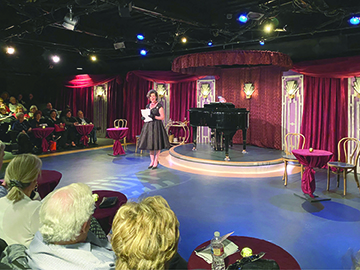
Creek’s Act Is Back: After 500 days without a live performance, Cherry Creek Theatre is reopening with Tenderly Aug. 6-29. Susie Snodgrass is shown in photo welcoming patrons to the last live show in Jan.-Feb. 2020.
Cherry Creek Theatre — After more than 500 days without a live performance, Cherry Creek Theatre is reopening in the 400-seat Elaine Wolf Theatre in the JCC Community Center. Tenderly, the Rosemary Clooney musical, is the company’s 11th season opener Aug. 6-29. Told through her signature songs, the two-person musical takes audiences beyond the public persona limelight with an intimate look at her personal life from the Appalachian roots to Hollywood stardom. Cherry Creek Theatre’s previously announced titles, Steel Magnolias and Jest a Second run in the Wolf Oct. 1-24 and Oct. 29-Nov. 21. Information: 303-316-6360.
Buell Theatre — When Covid hit last year the Denver Center for the Performing Arts (DCPA) canceled or postponed all of its theatrical productions, including locally produced and touring Broadway shows. Prior to the latest announcement, DCPA had disclosed the resumption of indoor, in-person productions starting with Disney’s The Lion King, Dec. 2-Jan. 2. The Tony winning show is known as much for its music and moving story as it is for its artful costumes, puppetry and choreography. Hamilton is set to follow The Lion King Feb. 22-March 27, 2022. My Fair Lady, 1776, Mean Girls, and Ain’t Too Proud initially announced for this fall were postponed until 2022. With restrictions being lifted in other major cities, it is conceivable, but doubtful, that one or more shows could be brought back this fall. Information: 720-865-4220.
Arvada Center — As lights come up and the curtain rises again, the Arvada Center is opening the 2021 season with I Do! I Do!, Sept. 10-Oct. 10. The two-person musical is a touching story that follows the sweet and sour moments of 50 years of love and marriage. Information: 720-898-7200.
Outdoor Concerts

Live Concerts Return: Swallow Hill Music is bringing the Shady Grove Picnic Series back to Four Mile Historic Park on Thursday evenings June 3 through Aug. 26, 6:30 p.m. Hal Aqua & The Lost Tribe kick off the series on June 3.5
Shady Grove Picnic Series — Shuttered last summer, Swallow Hill Music has announced it is bringing the Shady Grove Picnic Series back to Four Mile Historic Park on Thursday evenings starting June 3 and ongoing through Aug. 26, 6:30 p.m. Hal Aqua & The Lost Tribe kick off the series on June 3, followed by Dakota Blonde on June 10. Cary Morin & Ghost Dog entertain on June 17, followed by Extra Gold June 24. Information: 303-777-1003.
DCPA Galleria & Sculpture Park — A series of open-air, outdoor cabaret concerts are coming to the Galleria and Sculpture Park beginning with an Evening of Jazz with Sheryl McCallum June 5 at 3 p.m. and again at 5:30 p.m. The Colorado Symphony follows with a series of outdoor chamber music concerts under the glass in the complex, June 17-20, 6 p.m. Information: 720-865-4220.
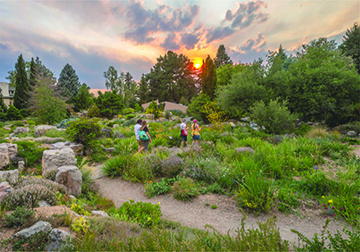
Music In The Gardens: Evenings al Fresco is returning to the Denver Botanic Gardens on select Mon.-Wed. June 7-Aug. 4, 4:30-8:30 p.m. Attendees can stroll the grounds during the event. Photo: Scott Dressel-Martin
Denver Botanic Gardens — The Garden’s Summer Concert Series was canceled earlier this year. Produced in partnership with Swallow Hill Music, some shows may possibly return. Swallow Hill and York Street, however, are bringing back Evenings al Fresco on select Mon.-Weds. from June 7 to Aug. 4, 4:30-8:30 p.m. The season opens with Matt Skellenger and his jazz group. Information: 720-865-3500.
City Park Jazz — The nine free Sunday concerts at Denver’s City Park Pavilion are returning June 13-Aug. 8, 6-8 p.m. except the Brass Band Extravaganza June 20, 5-8 p.m. Highlight event is a Denver Jazz Heritage Celebration featuring the El Chapultepec All Stars, July 25. The event is also celebrating the life of Denver jazz legend Freddy Rodriguez Sr. who died of Covid. His son, Freddy Jr., will play at the show.
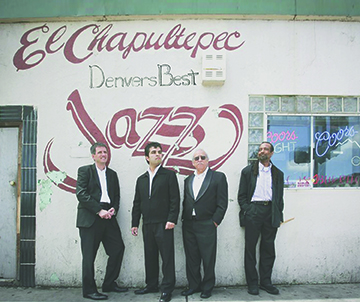
Jive In The Park: The nine day free Jazz in City Park concerts return June 13-Aug. 8. Highpoint is the Denver Jazz Heritage Celebration featuring the El Chapultepec All Stars (pictured) on July 25.
Red Rocks Amphitheatre — The storied U.S. venue sat empty most of last year, but is likely to lead Denver’s live music comeback with rapid additions of shows. It had already opened to 2,500 people per show in March. Top upcoming shows include Big Head Todd & the Monsters June 12-13 and Chicago on June 17. Two Days of Reggae on the Rocks returns Aug. 21-22. Information: 720-865-2494;
Levitt Pavilion — The Ruby Hill Park venue kicked off the season in May announcing 10 free concerts through Sept. 18. With capacity lifted, however, look for the site to add paid concerts as early as July 4. Information: 303-578-0488.
Indoor Concerts

She’s Got Rhythm: Heidi Schmidt sings with the Colorado Jazz Repertory Orchestra performing at the Lakewood Culture Center June 6. Photo: Elijah Patchen
Swallow Hill Music — Swallow Hill has announced it is launching eight concerts in Daniels Hall. Performances begin with Tony Trischka on Sept. 10, Carrie Newcomer Sept. 11, followed by the Sons of the Pioneers on Sept. 25. Announcement of added shows likely will come quickly. Information: 303-777-1003.
Mission Ballroom — Like other indoor venues, the Ballroom has been booking events for months. But expect capacity crowds in the 4,000 seat building on July 4 when Zeds Dead has been booked, followed by Primus on stage July 30. Information: 720-577-6884.
Lakewood Culture Center — Look for in-person crowds of blues-jazz lovers to fill the theatre as the Colorado Jazz Repertory Orchestra is booked to perform the best of Count Basie and other renowned jazz artists June 6, 2 p.m. Information: 303-987-7845.
Arapaho Philharmonic — Proof there’s light at the end of the tunnel for live performances, the Philharmonic plays American Masters Old & New at the First Church of the Nazarene on E. Hampden Ave. June 11, 7:30 p.m. The evening of music pairs Aaron Copland’s Appalachian Spring Suite with works by modern composers. Information: 303-781-1802.
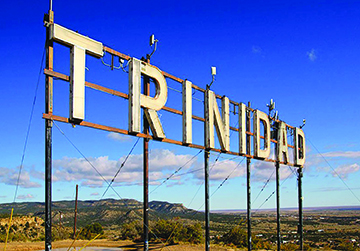
by Regan Bervar | Apr 23, 2021 | General Featured
“Rather than turning the page, it’s much easier to just throw the book away.” — Anthony Liccione
 by Luke Schmaltz
by Luke Schmaltz
Sometimes, the greener grass on the other side of the fence is attainable — as long as you’re willing to go 199 miles south (three hours and three minutes by car) to get there. Trinidad, Colorado, is a former mining town with three-or-so centuries of history, a patchwork topography of dilapidation and new development and a lot of potential.
As Denver’s metropolitan growing pains metastasize into cosmopolitan cancers, a few longtime advocates and sworn spouses of the Mile High City are doing the unthinkable — they are eyeing new climes in hopes for a fresh beginning. Once upon a not-too-distant past, Denver was the best kept secret of the Mountain West region. Soon, however, it became a blaring advertisement, then an oversaturated trend, and is now a hyper-capitalized, ultra-modern, less-remarkable version of its former self.
While recent transplants are none the wiser, longtime residents pine for the old times. The days of one-of-a-kind, mom-and-pop joints and relatively safe neighborhoods where you could find a spot to park your car in front of your affordably-priced place to live.
While Trinidad has been patiently waiting like a distressed maiden on the side of the freeway, its rescue had to occur in stronger gestures than just well-meaning sentiments. Those have finally arrived in the strongest form of statement possible: commerce. Movers and shakers not only from Denver but surrounding areas are pouring their assets and creative juices alike into redeveloping a once-thriving metropolis in the effort to contribute to a newly-emerging urban economy.
The Broadway Cabal
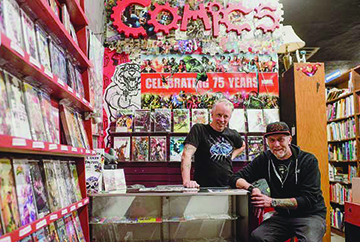
Jim Norris and Matt Meygasi of Mutiny Information Cafe are set to open a second location in Trinidad, Colorado.
Jim Norris and Matt Meygasi, co-owners of Mutiny Information Cafe, often look out of their shop’s front window across Broadway at their music venue neighbors, The Hi-Dive. The latter is owned by Curt Wallach and Suzanne Magnuson and has seen South Broadway fluctuate from a booming stretch of business development to its current state of shuttered, Covid-19-induced squalor. The latest commonality between the two teams is not that they share property in an embattled district of Denver, but that they are expanding operations into the untapped and exponentially promising town of Trinidad.
Norris and Meygasi will soon be opening a second location of the locally beloved and internationally infamous Mutiny Information Cafe. Meanwhile, Wallach and Magnuson will be opening a second bar/ music venue in the currently fallow Trinidad Lounge. Wallach and Magnuson have partnered with Denver trailblazer Kayvan Khalatbari as 50/50 owners of the bar and adjacent retail space. Mutiny Information Cafe will be their first tenants.
These migrating enterprises are a testament to the scrappy, independent, forward-thinking character of many Denver DIY businesses, which are disappearing at an alarming rate due to Covid-19 restrictions and the hyper-capitalization that is synonymous with gentrification. In addition to running unique businesses vital to the personality of South Broadway, the proprietors of Mutiny and Hi-Dive possess healthy doses of hope and the desire to work hard to create a better future.
Thus far, the town of Trinidad at large is welcoming new businesses with open arms. Mayor Phil Rico explains, “We are trying to improve our economy and become more diversified. People who want to move down here and open businesses — they are welcome to it. New businesses will boost our local economy and hopefully give residents who are already here some other options that may not be available right now.”
New Beginnings
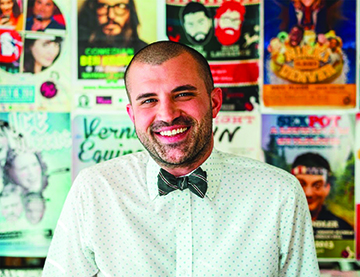
Kayvan Khalatbari is a Denver business innovator who is expanding his progressive ideas to an untapped market.
Kayvan Khalatbari is a well-known Denver figure in many circles, primarily those of business, art and politics. The former mayoral candidate continues to blaze an entrepreneurial trail across the city, providing jobs, opportunities and outreach. His various ventures include (or have included) a beloved chain of dine-in/takeout joints known as Sexy Pizza, a cannabis dispensary, a consulting business, the widely-revered Sexpot Comedy collective, and more. After years of grassroots community building that was relentlessly countered by an unchecked, city-wide thirst for corporatization, Khalatbari’s gaze began to scan the landscape in search of more fertile grounds for his enterprises.
When asked about the primary drivers that swayed him to expand into Trinidad, Khalatbari explains, “I have trouble sleeping and breathing in Denver, the traffic, and frankly — the number and the type of people that have moved to Denver recently. It’s a lot of folks who seem really excited about the party aspect of Denver while not offering anything to the community, not offering back anything of substance.”
As a front-seat witness to gentrification, Khalatbari pulls no punches. “I’ve seen a lot of things I really enjoyed about Denver fall by the wayside [such as ] music venues, restaurants, and friends moving away. When I’m in Denver, even before the pandemic, I largely just stayed at home and had friends over. There’s nothing unique about it anymore. It’s pretty much in line with other major cities in terms of the types of places it has to hang out in and the types of people you’ll encounter. That’s what’s unique about Trinidad. I think, in a lot of ways, it’s more diverse than Denver.”
Khalatbari clarifies that he is in no way dismissing the city that has been so good to him and is quick to recognize Denver’s enduring merits. “I don’t want to make it sound like I despise Denver. I still love Denver; it has given me everything professionally that I could have ever asked for. I still live there most of the time, my girls still go to school there, I still have businesses there … but it’s just run its course and as I get older it makes sense for me to plant roots in a place that’s a little more long term, you know, for my mentality and my sanity.”
Moving forward, Khalatbari has purchased several properties in Trinidad that require varying degrees of remodeling, repair and TLC. Among these are The First Baptist Church, a large retail space in the downtown area, the Trinidad Lounge, an historic train depot, and a residential property. The local community is tight-knit and includes families and business interests that have been established in the area for generations.
Natural wariness of strangers aside, Khalatbari explains that the reception of himself and other outsiders looking to contribute to Trinidad’s development and revitalization has been overwhelmingly positive. “In the eight months I’ve been here, I’ve had conversations with probably half the city council, and I’ve met with tons of people across the city and for the most part everyone has been very supportive. I’ve been overwhelmed with the people in this town supporting wherever they can, wanting to collaborate, wanting to do good things, to feel the energy — it’s pretty palpable around here I’d say.”
Khalatbari underscores the importance of working with the Trinidad community and other outside investors so that, moving forward, the city as a whole can avoid becoming just another hyper-capitalized, unattainable swath of Colorado gentrification. “There’s a genuine fear of this becoming another inaccessible place in Colorado. One of the reasons I moved here is to see this town that has so much potential, but hasn’t had the investments, come to life while avoiding that sort of an outcome. I work a lot with worker cooperatives and employee-owned businesses. It is capitalism, sure, but it’s the shared economy capitalism. My pizzerias are employee-owned, and I would love to see that kind of model take hold in a place like this.
Wally’s World

Trinidad, Colorado is a city of 9,000 people, most of whom are ready to embrace redevelopment.
Wally Wallace is the Economic Development Director for the City of Trinidad. What the city planners may not have known when they hired him is that he’s also got a creative streak that makes him a seriously valuable asset to the city’s future. A comedian and a musician, among other pursuits, Wallace’s excitement about the city is infectious. He has a litany of proposed events queued up for consideration including Spaghetti and Western festival (an homage to the city’s Italian population), comedy events, themed bicycle rides and a weed-picking enthusiasts’ initiative to rid the town of goat heads.
He mentions Fisher’s Peak State Park — the recently-opened massive open space project that is now the second largest state park in Colorado. “They are projecting that this could potentially bring in up to $15 million into this community per year,” Wallace explains. “We are working on an interstate trail system where people will be able to hike and bike back and forth between Colorado and New Mexico.”
Wallace is responsible for introducing Khalatbari to Trinidad and explains how another Denver innovator — Dana Craw-ford — is making waves locally as well. Crawford is famous for the renowned and highly successful remodeling of Larimer Square and Union Station in Denver. She is currently spearheading the $18M remodel of the Fox Theater in Trinidad, which is a near-exact small-scale replica of NYC’s Carnegie Hall.
Send In The Skilled Tradespeople

The Downtown Trinidad Development Group welcomes Denver businesses and skilled tradespeople alike.
Meanwhile, across town, Karl Gabrielson, the director of the Downtown Trinidad Development Group is looking at the big picture. Similar to Mayor Rico, Khalatbari, and Wallace, he acknowledges the concern that updating the city might erase its small-town feel. “We are a long way from there,” he explains. “We are still in the early stages of redevelopment, but the conversation has begun.” He explains. “Trinidad has been boom and bust over and over again and we need to look at long-term sustainability — to develop a business environment that can level out those ups and downs.”
Between an investment group from NOLA planning to build a boutique hotel and Phil Long Ford Dealership owner Jay Cimino sinking millions into the revitalization effort, it has also become apparent that Trinidad needs housing and tradespeople in order to sustain the effort and provide for new arrivals. By and large, Gabrielson is optimistic, saying “Overall, it’s a great time to experience Trinidad. It’s been overlooked for a long, long time.”
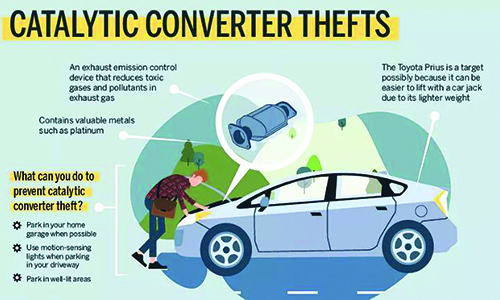
by Regan Bervar | Mar 19, 2021 | General Featured
“The number one rule of thieves is that nothing is too small to steal.” – Jimmy Breslin
 by Luke Schmaltz
by Luke Schmaltz
A large number of Denver residents are sitting on top of a hidden treasure and they don’t even know it.
Below the interior cabs of all modern cars, along the vehicle’s undercarriage parallel to the driveshaft, sits the exhaust system in a series of pipes, gaskets and couplings. Within this assembly, for all cars made after 1975, is a catalytic converter — a filter which transforms harmful exhaust compounds (hydrocarbons, nitrogen oxide and carbon monoxide) into inert gases.
This piece of automotive technology contains semi-precious metals which are crucial to the catalyzing process. These include palladium, rhodium and platinum — rare metals that are sought after and valued on par with gold. It is no secret to enterprising thieves that these components can fetch between $150 and $300 per unit from scrap yards and chop shops — and sometimes even more.
Amid the economic hardship of the past year, the risk-to-reward ratio of catalytic converter theft is attractive enough for someone with a few tools and nothing to lose to take action. Anyone with enough nerve and a bit of know-how can simply crawl beneath a car in the middle of the night and start hacking away. Vulnerable cars are everywhere — parked

Theft On The Rise: Catalytic converter theft is up 1600% in the Denver area from 2019.
on the street, in parking garages, strip malls and driveways. As jobs disappear, pandemic relief runs out, and perhaps a bad case of cabin-fever boredom takes hold — car part pirates set out to find their livelihood amid a vast urban landscape abundant with low-hanging fruit.
The number of thefts across Denver is on the rise like the temperature gauge on an overheating vehicle. In 2019, a total of just 15 were reported, while in 2020, the cases jumped up to a staggering 257. Meanwhile, 2021 is on par to leave that number in the dust, as 108 cases of stolen catalytic converters were reported by the end of January.
The Winners
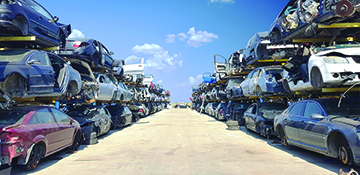
Junkyard: Catalytic converters make a quick stop at a place like this so the precious metals therein can be removed.v
Experienced thieves who know where to slither and hack can get away with half a dozen or more converters per night. Doorbell cameras have captured these heists taking place with alarming speed — some in under two minutes. Once these are sold to a scrap yard or fenced to a black-market processing facility, the thief makes a few bucks and the next guy (the fence) digs into the devices, harvests the precious metals therein and sells them to a dealer. While laws are in place that supposedly forbid scrap metal dealers and junkyards from accepting stolen goods, there is by no means a task force monitoring these markets. If thieves are bold enough to break the law in plain sight, what’s to stop them from continuing to do so until the valued goods find their way back into the supply chain?
Next in the catalytic converter economic stimulus line are the auto repair shops. As this is becoming a routine procedure, the parts can be replaced with a fair degree of quickness and ease. Yet, parts and labor cost money and even if the mechanic is an honest one, they’ll be billing each client anywhere from $1,000 to $3,000 per job.
The Losers
The victim’s experience is invariably the same. A vehicle owner gets in their car, turns the ignition key to start the engine and is jolted upwards by a roaring blast of exhaust from beneath. In previous years, the individual may have thought it was just a temperamental automotive glitch that would work itself out. More recently, however, a person in this scenario quickly comes to the harrowing realization that part of their car has been stolen right out from underneath them.
After a sputtering, cantankerous trip to the mechanic, they are hit with a repair bill that most likely places yet another degree of economic strain on an already dire situation. While folks with comprehensive insurance coverage can send the bill to their carrier, a great many drivers out there do not have such coverage because they are trying to save money, and when they bought their insurance, rampant car part theft was probably not yet on their radar.
The Also-rans
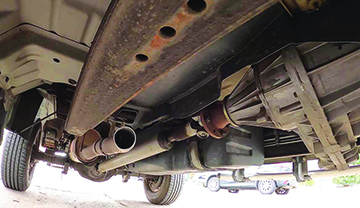
Catalytic Converter: If you want to keep your catalytic converter, knowing how to weld is a valuable skill.
The associated fallout of these thefts is the additional burden that is placed on the Denver Police Department. While there is little or nothing that responding officers can do to recover the stolen part, there is considerable strain in terms of the man hours it takes to follow up on every case, to fill out paperwork and to listen to the victims tell their stories.
Enough Is Enough
Across the Mile High City, people are becoming increasingly aware that they could very well be the next victim in line to have their catalytic converters stolen. The obvious solution is to park your car in a garage, lock it up for the night and the problem is solved. The problem with that, is that the vast majority of car owners, especially in neighborhoods near the city center, do not enjoy such luxuries.
High profile vehicles like SUVs, Hummers and 4×4 trucks are the easiest targets, as they do not need to be jacked up off the ground in order for the thieves to access the converter. A smart driver on a shoestring budget can opt to park their Prius between a Ford F-250 and a Land Rover and hope their neighbors bear the brunt of the thievery instead of them.
Proactive citizens can sit up all night and guard their cars with a flashlight and a baseball bat. Yet, most people enjoy their sleep and do not wish to confront criminals in the pale moonlight. Thankfully, this scourge of theft has necessitated a suite of new inventions designed to keep your catalytic converter attached to your car’s exhaust system and out of the hands of criminals. In yet another economically beneficial outcome of the rise in theft, these devices range anywhere from $125 to $700 or more apiece, plus installation if you’re not handy with tools. These products are carving out a market niche for themselves under names such as The Cat Clamp, Cat Security, Cat Strap and more.
- Cat Strap: This alarm-style device features contact and motion sensors. The strap is tethered along the length of the exhaust system (which includes the catalytic converter) by a series of metal clamps and rings. The sensor is then wired to the battery and the alarm receiver is mounted beneath the hood. Contact with the exhausts system or significant motion beneath the car in the vicinity of the catalytic converter will set it off. Thief activity beneath your car sets off the alarm, which then deters the perpetrator. Professional installation is recommended.
- Cat Security: This device is strictly hardware, and acts as a type of shield between your catalytic converter and the ground. The product is essentially sheet metal which is pre-fabricated to fit the undercarriage of specific models of cars. The shield is then bolted into place with a combination of security rivets, bolts and self-tapping screws. The protective barrier is immediately obvious to and should convince most thieves to think again. Professional installation is optional.
- Cat Clamp: Another hardware-based product, this invention uses braided, heavily-rated steel cables and heavy-duty steel clamps and adaptor plates which, once mounted and installed, surround your catalytic converter in a metal cage. The various product sizes can accommodate everything from regular sized cars to large, heavy duty diesel trucks. Hardware and cable run the length of the exhaust system and present an immediate visual deterrent to thieves — as it is obvious the catalytic converter is not coming off without a whole lot of effort and noise. Professional installation recommended.
Extreme Measures
A similar approach is to have the catalytic converter welded to your car’s frame, which would make it much harder and far more time consuming to steal. Another method is to have your car alarm system recalibrated to detect the subtle humming of a reciprocating saw or the light tog of a ratchet wrench. Other folks are engraving their car’s VIN number to the housing on the converter, which to an average thief might be a deterrent, but to an enterprising criminal — it might be an invitation to pursue identity theft.
The other options are to string barbed wire around your car every night and risk getting cited for littering or reckless endangerment. You could train rattlesnakes to coil up in the undercarriage at night and take a swipe at anything that crawls under the car. Or you could just sell the damn thing and get a bike — along with an arsenal of four or five heavy duty U-locks.























